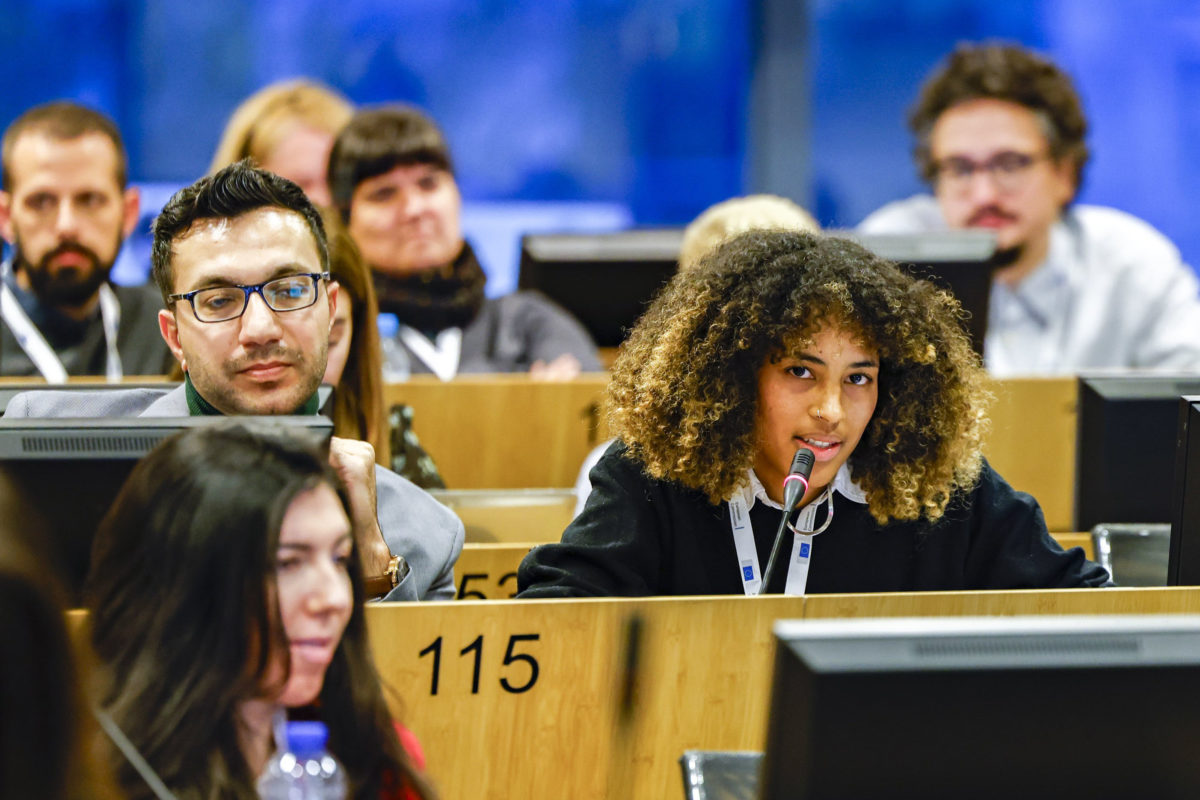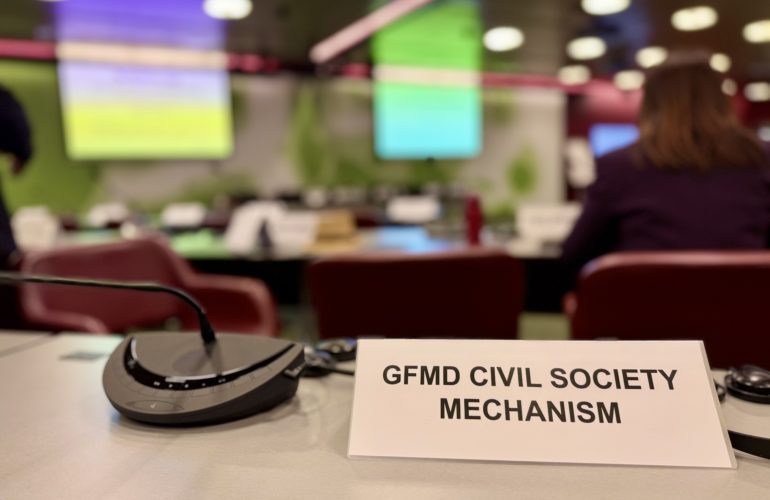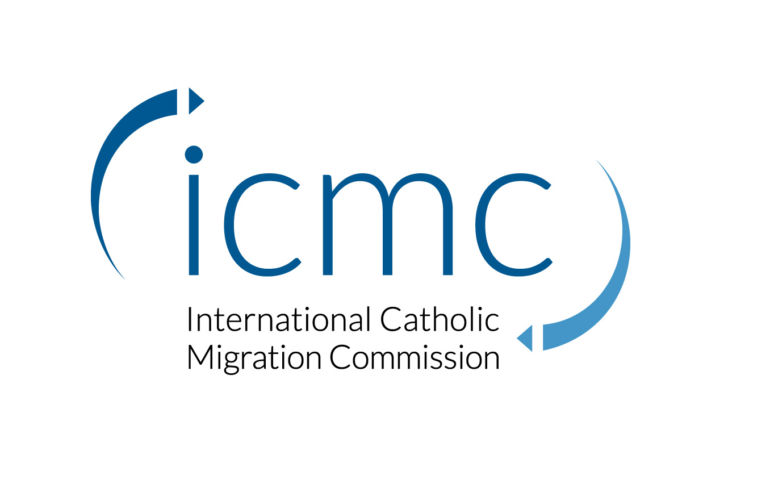European Migration Forum Elects ICMC Europe to Represent European Civil Society
Following her election as a European civil society representative on the Bureau of the European Migration Forum for 2024-26, we catch up with Anna Coulibaly of ICMC Europe on her hopes and priorities for the coming period.

In 2015, the European Commission, part of the European Union’s executive body, in cooperation with the European Economic and Social Committee, established the European Migration Forum (EMF). The EMF is a platform for dialogue between European civil society organizations and European institutions on immigration, asylum, and migrant integration.
The EMF meets annually, and in attendance are civil society organizations working at the European and national levels, as well as representatives from EU institutions, EU Member States, and local and regional authorities. EMF outcomes inform key EU legislation, in particular, on migrant and refugee integration, most notably in the case of the 2019 EMF 10 Recommendations adopted by the Forum that were incorporated into the EU Action Plan on Integration and Inclusion for 2021-27.
At the 8th EMF annual meeting in December 2023, ICMC Europe Project Officer Anna Coulibaly was elected as a European civil society representative on the EMF Bureau. At the start of her two-year mandate, we caught up with Anna to discuss her experiences with the EMF and the priorities she plans to take forward during 2024-26.
***
Hi Anna, and congratulations on your election! Can you tell us a bit about yourself and your role at ICMC Europe?
Thanks! I’ve been with ICMC Europe since 2021, working on the SHARE Network activities. SHARE is an inclusive network of EU-based communities and actors engaged in the welcoming and inclusion of newcomers in Europe. It was established in 2012 by ICMC Europe and is active across the EU.
My role covers several core areas of SHARE’s current work, namely expanding and improving safe pathways to protection in Europe for refugees via the SHARE QSN program and supporting the meaningful participation of refugees and migrants in programming and policymaking that affects them. I also work on SHARE’s engagement and support of the many rural communities across Europe that have played a central role in welcoming refugees and migrants in recent years.
How did you come to be involved with the EMF, and what can you say about your experiences so far?
In October 2022, I attended the 7th annual EMF meeting, which focused on youth – specifically on education and training, participation and engagement of young refugees and migrants in society and political life, youth mobility, and the specific challenges and measures linked to youth integration. The 2022 EMF meeting took place against the backdrop of the many refugees arriving into the EU from Ukraine, a significant proportion of whom were children and young people, so that of course informed the discussions.
At the 2022 meeting, I worked with the Legal Pathways and Integration Unit of the European Commission’s Directorate General for Home Affairs to lead a workshop on advancing the participation and engagement of young migrants at the local, national, and European levels. We ran breakout sessions with approximately 50 participants, during which they reflected on comprehensive approaches to meaningfully involve refugees and migrants in the design, implementation, monitoring, and evaluation of policies and strategies for migration and integration.
Here I drew on SHARE’s long experience in this area, including the SHARE Refugee Advisor Programme, and our extensive consultations with partners and stakeholders around Europe on incorporating participatory approaches into their work. I was really pleased to bring this expertise to the European level once again, this time in the context of the EMF, and to support participants’ reflections on the value of participation and the practical actions they can take to make it a reality.
You were elected to the EMF Bureau at the 8th EMF annual meeting in December 2023. Can you tell us how that came about, what the role of the Bureau is, and why you wanted to be involved?
The EMF Bureau organizes the EMF meetings and works with the EMF Secretariat at the European Economic and Social Committee to develop the meeting agendas. The Bureau has six members: one representing the European Commission, one the European Economic and Social Committee, and four civil society representatives – two representing national civil society organizations, and two for those civil society organizations working at the European level. The Bureau meets four times per year, and civil society representatives each have a two-year mandate. In December 2023, the mandates of two civil society Bureau representatives came to an end, and an open application process was launched.
I was motivated to apply because of the contribution I felt ICMC Europe and the SHARE Network could bring. SHARE brings the experience and voices of its diverse and multi-stakeholder network of actors and communities on topics related to integration, inclusion, participation, safe pathways, and community sponsorship, all of which are crucial aspects of migration and integration policy at the EU level.
I also think that the EMF provides a unique opportunity to build bridges between the local and regional levels, the core focus of SHARE, and both civil society and institutional policymakers at the EU level. Local and regional voices are so often underrepresented in European discussions, and our bottom-up, multi-level, and participation-focused approach can make a real contribution to remedying this gap. Given that a function of the EMF is also to share expertise and best practices among both civil society and institutional stakeholders, it’s also a natural extension of the knowledge exchange that SHARE has been engaged in since it was established.
I set all this out in a one-minute intervention at the 8th EMF meeting in December 2023, after which I was formally elected.
The EMF meets once a year, and each meeting focuses on a different thematic area. Which areas have been covered during your involvement with the Forum? What is your role as a civil society representative in selecting the themes, and do you have any insight into what upcoming EMF meetings might focus on?
The thematic area of focus for each EMF meeting generally coincides with that of the current European Year. The focus of the 7th EMF meeting on young migrants, for example, followed the 2022 European Year of Youth. The overarching theme of the 8th EMF meeting in 2023 was ‘Migrants in Europe today: specific needs, skills and communication for stronger inclusion,’ which incorporated the European Year of Skills taking place in 2023-24.
The multi-year nature of the European Year of Skills means that the topic of the 9th EMF meeting is less clear. We in the Bureau can propose topics, although the final decision on the theme sits with the EMF Secretariat at the European Economic and Social Committee. From my perspective, the fact that 2024 is a European election year makes a strong case for participation to be the central focus for the EMF in this period, and that’s what I plan to advocate for in the forthcoming Bureau discussions on that point.
One stated aim of the EMF is that EU institutions ‘strive to use its outcomes to shape future EU law and strategy on migration, asylum, and integration’. How much does this happen, in your experience, and could the link between the Forum and EU policymaking be improved in any way?
The EMF is a positive initiative overall, as is the considerable investment from the European Commission in bringing together such a diverse cross-section of civil society stakeholders in Brussels each year.
That said, I do think there is a lack of transparency in how discussions at EMF meetings impact the thinking and decision-making of policymakers at the EU level. For example, the inputs of civil society at EMF meetings are not published, which would certainly be a valuable output. Personally, I would like to see some kind of strategic document summarising the discussions at each EMF meeting, both to document the very rich discussions and act as a basis for civil society advocacy going forward. I would also like to see a more consistent and larger attendance of European Commission representatives from across the relevant Directorates, to enable networking and support further dialogue.
What other priorities will you take forward during your mandate, and why?
Aside from the issue of transparency in relation to influencing policy, participation is really the key priority that I plan to take forward.
As well as participation as a potential thematic focus of upcoming EMF meetings, I also would like to offer the expertise of SHARE and ICMC to further develop the participation of refugees and migrants in the EMF meetings. There have been some positive recent steps in this context, particularly in 2023 with the inclusion of a refugee speaker with direct experience of participating in a training and skills development program, but I think much more can be done to adequately prepare and support refugees and migrants to speak at EMF meetings.
Here I would point to practical issues, such as providing interpretation rather than requiring someone to speak in English. This would enable refugee and migrant speakers to make their address in their first language, or in a European language in which they are proficient. We also know from SHARE that it is crucially important to prepare someone to make an intervention in what can be quite an intimidating space, and to ensure that refugees and migrants feel empowered to share their experiences in an honest and nuanced way. If we want to learn from lived experience, we cannot solely focus on ‘good news’ success stories, but must instead seek out accounts that tell us something valuable about how to improve what we are doing. That’s really what makes participation meaningful.
Finally, you’re starting your role with the EMF at a time of significant changes for the EU legal and policy framework on migration and asylum, with a great deal of concern expressed by civil society at the recently agreed EU Pact on Migration and Asylum*. How do you think this will impact the work of the Forum going forward?
The introduction of the Pact has, of course, made much of the advocacy at the EU level more adversarial in its tone, given the strong nature of civil society opposition to many of its provisions. That said, I think civil society stakeholders are always looking for opportunities for dialogue at the EU level, both amongst ourselves and with EU policymakers, and that this is an added value of the EMF that perseveres regardless of the prevailing policy context.
It is my strong hope that future EMF meetings explicitly address the Pact and its associated legislation- It would make very little sense to try to ignore it, however difficult the resulting discussions might be, and I’ll certainly be voicing my support for future EMF agendas to include specific opportunities for dialogue about the Pact and its implications.
***
* The EU Pact on Migration and Asylum is a is a policy document that sets out the EU’s migration, asylum, integration and border management, and a package of new regulations and policies designed to implement it. The Pact was first presented by the European Commission in September 2020 and, after three years of negotiations, on 20 December 2023 the Council and European Parliament announced that they had reached political agreement on the Pact’s key issues. Further technical negotiations and formal adoption of the package will take place in 2024.

Rachel Westerby
Independent writer and researcher on migration and refugees.



